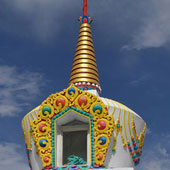Buddhism has influenced the life and thinking of the people in Ladakh owing to its widespread presence in this region. One can argue that it is this presence that has lent itself to the peace loving ways of the Ladakhi people. However, monks, monasteries and religious practices remain disconnected from the social and moral order. It would be fair to say that amidst the harsh mountainous environment of Ladakh, co-operation and goodwill amongst people is crucial for survival. Major crimes are unknown within this region. Ladakhi people broadly idealize a harmonious, sustainable and peaceful life. Children are loved, and looked after, growing up to be part of a strong giving and receiving relationship. The people in general, come across as irrepressibly happy, with a strong sense of self. They remain connected to their land having developed a close bond with their natural surroundings due to their daily lifestyle.
They remain detached and their contentment does not rest on external situations, but rather on their inner calmness. Buddhism certainly fosters some of these feelings.
Numerous monasteries, well read and well traveled monks that are spreading the religion globally, the simple lives of peace loving people, the sensitive border areas, the rocky landscapes at whose mercy the people travel, the patient and long waits for the arrival of food, newspapers and more through trucks traveling into Ladakh - are causal factors that shape the way people live and think, through their daily life.
The sparse empty landscapes, vastness of nature, absence of any network or power in most areas, also contributes to the mental well being and meditative atmosphere in Ladakh. Most people travel here to disconnect from their routine, day-to-day life and come closer to nature.
This module documents some of the practices that I came across while working in this region.

An 'Om Mani Padme Hum' chant painted on a stone near the highway to Hanle, Changthang.

Auspicious chants can be seen frequently painted on stones and mountains.

